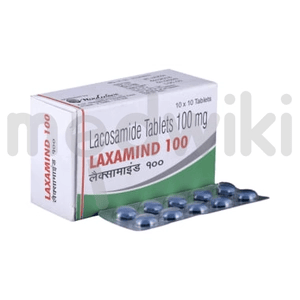licotar LACOSAMIDE
Introduction to licotar
Licotar is a medication primarily used to treat partial-onset seizures in individuals with epilepsy. It is available in tablet form and works by stabilizing electrical activity in the brain. Licotar is an effective treatment option for managing seizures.
Composition of licotar
Licotar contains the active ingredient Lacosamide, which is responsible for its therapeutic effects. Lacosamide affects sodium channels in the brain, helping to reduce abnormal electrical activity that can lead to seizures.
Uses of licotar
- Treatment of partial-onset seizures in epilepsy
Side effects of licotar
- Common side effects: dizziness, headache, nausea
- Serious side effects: coordination problems, heart rhythm issues
Precautions of licotar
Licotar can cause dizziness and coordination problems, which may impair your ability to drive. It may also affect heart rhythm, so it is important to inform your doctor if you have any heart conditions. Do not take licotar if you are allergic to Lacosamide or any of its ingredients.
How to Take licotar
Licotar is usually taken by mouth, with or without food. The typical starting dose for adults is 50 mg taken twice daily, with a maximum recommended dose of 400 mg per day. Always follow your doctor's instructions regarding the dosage and administration of licotar.
Conclusion of licotar
Licotar, containing the active ingredient Lacosamide, is a medication in the therapeutic class of anticonvulsants. It is primarily used to treat partial-onset seizures in epilepsy. Manufactured by a reputable pharmaceutical company, licotar is an effective option for managing seizures. Always consult your healthcare provider for personalized advice and information about licotar.


Can I take Licotar with other prescription drugs?
Licotar can interact with other medications, increasing the risk of side effects or reducing effectiveness. It's important to inform your doctor about all the medicines you take, including over-the-counter drugs and supplements. Your doctor can help manage potential interactions and adjust your treatment plan as needed.

Can Licotar be taken safely while breastfeeding?
Licotar's safety during breastfeeding is not well-established. It's unclear if it passes into human breast milk. If you're breastfeeding or planning to breastfeed, talk with your doctor about the safest options for managing your condition. They can help you make an informed decision about your treatment.

Can Licotar be taken safely while pregnant?
The safety of Licotar during pregnancy is not well-established. Animal studies have shown some risks, but human data is limited. If you're pregnant or planning to become pregnant, talk with your doctor about the safest way to manage your condition. They can help create a treatment plan that protects both you and your baby.

Does Licotar affect appetite?
Licotar doesn't typically affect your appetite. Most people taking this medication don't notice changes in how hungry they feel. If you notice any unexpected changes in your appetite after starting Licotar, talk with your doctor. They can help determine if these changes are related to the medication or if there might be another cause.

Does Licotar affect mood?
Licotar doesn't typically cause mood changes. Most people take this medication without experiencing anxiety or agitation. If you notice changes in your mood after starting Licotar, talk with your doctor. They can help determine if these symptoms are related to the medication or if there might be another cause.

Does Licotar affect sleep?
Licotar doesn't typically cause sleep problems. Most people take this medication without experiencing changes in their sleep patterns. If you notice changes in how well you sleep after starting Licotar, talk with your doctor. They can help determine if these changes are related to the medication or if there might be another cause.

Does Licotar cause headaches?
Headaches are not a common side effect of Licotar. Most people take this medication without experiencing any head pain. If you do get mild headaches while taking Licotar, staying well-hydrated and resting may help. You can also take over-the-counter pain relievers after checking with your doctor. For severe or persistent headaches, talk with your healthcare provider.

Does Licotar cause stomach upset?
Licotar can cause stomach upset, including nausea and vomiting, but these effects are not common. If you experience mild nausea, taking the medication with food might help. If you develop severe or persistent stomach issues, talk with your doctor. They can help determine if these symptoms are related to Licotar or if there might be another cause.

Does Licotar cause weight gain?
Licotar doesn't typically affect body weight. Most people taking this medication don't notice changes in their weight. If you experience unexpected weight changes, talk with your doctor. They can help determine if these changes are related to Licotar or if there might be another cause.

Does Licotar interfere with sexual function?
Licotar doesn't typically cause sexual side effects like erectile dysfunction or loss of libido. Most people take this medication without noticing changes in their sexual function. If you experience any persistent discomfort or changes in your sexual function while taking Licotar, talk with your doctor. Your doctor can help determine if your symptoms are related to the medication and recommend appropriate treatment to address any issues.

Does Licotar limit driving?
Licotar can cause dizziness and coordination problems, which may impair your ability to drive safely. Avoid driving until you understand how Licotar affects you. If you feel dizzy or lightheaded, do not drive. Talk with your doctor about any concerns you have about driving while taking this medication.

Does Licotar make it hard to think or concentrate?
Licotar can cause cognitive side effects like difficulty concentrating or thinking, but these are not common. If you notice problems with your thinking after starting Licotar, talk with your doctor. They can help determine if these symptoms are related to the medication or if there might be another cause.

Does Licotar make people tired or drowsy?
Licotar can cause tiredness or drowsiness, but these effects are not common. If you notice you're feeling very sleepy or fatigued while taking Licotar, talk with your doctor. They can help determine if your tiredness is related to the medication or if there might be another cause.

For how long do I take Licotar?
Licotar is usually a long-term medication for managing epilepsy. You'll typically take it every day as a lifelong treatment unless your doctor suggests otherwise. How long you'll need this medication depends on your body's response, any side effects you experience, and changes in your overall health. Always talk with your doctor before changing or stopping your Licotar treatment.

How does Licotar work?
Licotar works by stabilizing electrical activity in the brain, which helps control seizures. It affects sodium channels in the brain, reducing the likelihood of abnormal electrical activity that can lead to seizures. This action helps manage epilepsy and reduce seizure frequency.

How do I know if Licotar is working?
Licotar is used to treat partial-onset seizures in epilepsy. You'll know it's working if you experience fewer seizures. Regular check-ups with your doctor are important to monitor the medication's effectiveness. Your doctor may adjust your treatment based on your seizure control and any side effects you experience.

How do I take Licotar?
Licotar is usually taken twice daily, with or without food. Swallow the tablets whole; do not crush or chew them. If you miss a dose, take it as soon as you remember unless it's almost time for your next dose. In that case, skip the missed dose and continue your regular schedule. Do not take two doses at once. Always follow your doctor's specific instructions regarding your dosage and any dietary restrictions.

How long does it take for Licotar to start working?
Licotar begins working shortly after you take it, but it may take several weeks to notice a significant reduction in seizure frequency. The time it takes to achieve full therapeutic effect can vary based on individual factors like your overall health and response to the medication. Take it exactly as prescribed for the best results.

How should I store Licotar?
Store Licotar at room temperature, away from moisture and light. Keep it in a tightly closed container. Do not store it in humid places like bathrooms. Always keep Licotar out of children's reach to prevent accidental swallowing. Check the expiration date regularly and properly dispose of any unused or expired medication.

Is it safe to drink alcohol while taking Licotar?
It's best to avoid alcohol while taking Licotar. Alcohol can increase the risk of side effects like dizziness and drowsiness. If you choose to drink occasionally, limit your alcohol intake and watch for warning signs like increased dizziness or coordination problems. Talk with your doctor about alcohol use while taking Licotar.

Is it safe to drink coffee or tea while taking Licotar?
You can drink coffee and tea while taking Licotar. There's no known interaction between caffeine and Licotar. However, caffeine can increase nervousness or jitteriness, so enjoy caffeinated drinks in moderation. If you notice any unusual symptoms, talk with your doctor.

Is it safe to exercise while taking Licotar?
You can exercise while taking Licotar, but be cautious. This medication can cause dizziness, which might affect your balance during physical activity. To exercise safely, start with light activities and gradually increase intensity. If you feel dizzy or lightheaded, stop exercising and rest. Talk with your doctor if you have concerns about your exercise routine.

Is Licotar effective?
Licotar is effective in treating partial-onset seizures in people with epilepsy. Clinical studies show it reduces seizure frequency and improves seizure control. Always follow your doctor's instructions and attend regular check-ups to monitor the effectiveness of your treatment.

Is Licotar safe for the elderly?
Elderly individuals may be more sensitive to the side effects of Licotar, such as dizziness and coordination problems. These effects can increase the risk of falls. It's important for elderly patients to be closely monitored by their doctor while taking Licotar. Dose adjustments may be necessary to ensure safety.

What are Licotar possible harms and risks?
Licotar can cause common side effects like blurry vision, feeling sick, headache, sleepiness, and dizziness. Rarely, it can cause serious problems like allergic reactions (skin rash, hives, swelling, fever), liver or blood problems (yellow skin/eyes, shortness of breath, dark urine). The extended-release version has similar side effects.

What disease or symptom is Licotar used for?
Licotar is used to treat partial-onset seizures in people with epilepsy. It helps control seizures by stabilizing electrical activity in the brain. Licotar can be used alone or with other medications to manage epilepsy and improve seizure control.

What is Licotar?
Licotar is a medication used to treat partial-onset seizures in people with epilepsy. It belongs to a class of drugs called anticonvulsants, which help control seizures by stabilizing electrical activity in the brain. Licotar can be used alone or with other medications to manage epilepsy.

What is the usual dose of Licotar?
The usual starting dose of Licotar for adults is 50 mg twice daily. Your doctor may adjust your dose based on your response and needs. The maximum recommended dose is 400 mg per day. Always follow your doctor's specific dosing instructions for your personal health needs.

Who should avoid taking Licotar?
Do not take Licotar if you're allergic to it or its ingredients. It should be used with caution in people with heart problems, as it can affect heart rhythm. Always consult your doctor about any concerns and inform them of your medical history before starting Licotar.
Available in 2 variations

strip of 10 tablets

strip of 10 tablets
















.svg)
